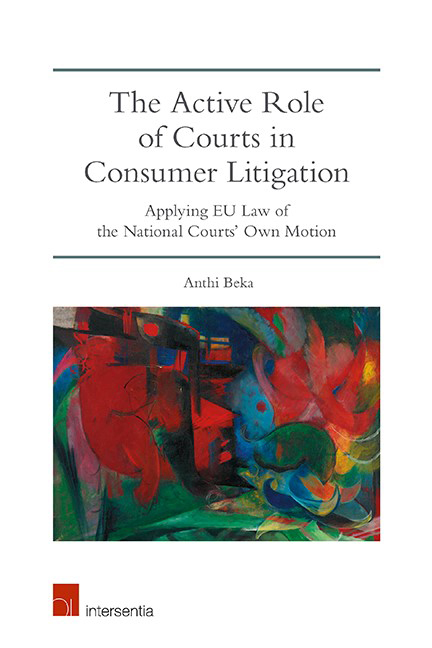Book contents
- Frontmatter
- Dedication
- Foreword by Professor Elise Poillot
- Introduction by Judge Etienne Rigal
- Acknowledgments
- Contents
- List of Cases
- List of Abbreviations
- Introduction
- PART I THE DOCTRINE OF THE ACTIVE CONSUMER COURT IN CONTEXT
- Chapter 1 Setting the Scene: Europeanization of Consumer Procedural Law and Judicial Protection of Union Rights
- Chapter 2 The General Rule on the Application of Union Law by National Courts of Their Own Motion
- Chapter 3 National Perspectives on the Application of Union Law by National Courts of Their Own Motion
- PART II THE EMERGENCE AND DISTINCTIVE FEATURES OF THE ACTIVE CONSUMER COURT DOCTRINE
- Final Conclusions: Changing the Narrative and Moving Forward
- Bibliography
- Index
- About the Author
Chapter 2 - The General Rule on the Application of Union Law by National Courts of Their Own Motion
from PART I - THE DOCTRINE OF THE ACTIVE CONSUMER COURT IN CONTEXT
Published online by Cambridge University Press: 31 January 2019
- Frontmatter
- Dedication
- Foreword by Professor Elise Poillot
- Introduction by Judge Etienne Rigal
- Acknowledgments
- Contents
- List of Cases
- List of Abbreviations
- Introduction
- PART I THE DOCTRINE OF THE ACTIVE CONSUMER COURT IN CONTEXT
- Chapter 1 Setting the Scene: Europeanization of Consumer Procedural Law and Judicial Protection of Union Rights
- Chapter 2 The General Rule on the Application of Union Law by National Courts of Their Own Motion
- Chapter 3 National Perspectives on the Application of Union Law by National Courts of Their Own Motion
- PART II THE EMERGENCE AND DISTINCTIVE FEATURES OF THE ACTIVE CONSUMER COURT DOCTRINE
- Final Conclusions: Changing the Narrative and Moving Forward
- Bibliography
- Index
- About the Author
Summary
This chapter situates the consumer ex officio doctrine within the broader theme of the ex officio application of Union law by national courts. The landmark ruling in that respect is Van Schijndel. It has already become common ground in the case law of the Court and in literature that the consumer ex officio doctrine stands apart from the“ general” position – the“ droit commun” – on the application of Union law by the courts of their own motion pronounced in Van Schijndel. In order to substantiate this claim and to grasp the distinctiveness of the doctrine of active court in consumer litigation, the remaining developments of Part I are devoted to the sua sponte consideration of Union law grounds before the national courts. In particular, this chapter presents the perspective of Union law, while the next (Chapter 3) will delve into certain Member States ‘ procedural traditions in relation to the same question. This way of analysis reflects the“ osmosis” of Union law and national laws. While the Court draws on the prevailing traditions of Member States, it bestows them with a“ European legal significance. ”
Both Chapters 2 and 3 trace the origins of the consumer ex officio doctrine from different perspectives and form the passerelle for Part II. The mandatory nature of consumer legislation and the considerations of inequality in legal representation underpin the doctrine of an active court in litigation involving the application of Union consumer law, which is distinct compared to the ex officio application of Union law. Its distinctiveness justifies a certain deviation from the principle of party autonomy and judicial passivity.
The purpose of this chapter will be to demonstrate under which terms the Van Schijndel line“ contrasts with” the Océano Grupo line of case law. The position of principle is that Union law does not require a mutation in the role of the courts. National courts are neither required nor prohibited by Union law alone to“ initiate the selection of arguments to be put in their balance” from the field of Union law.
- Type
- Chapter
- Information
- The Active Role of Courts in Consumer LitigationApplying EU Law of the National Courts’ Own Motion, pp. 45 - 76Publisher: IntersentiaPrint publication year: 2018



